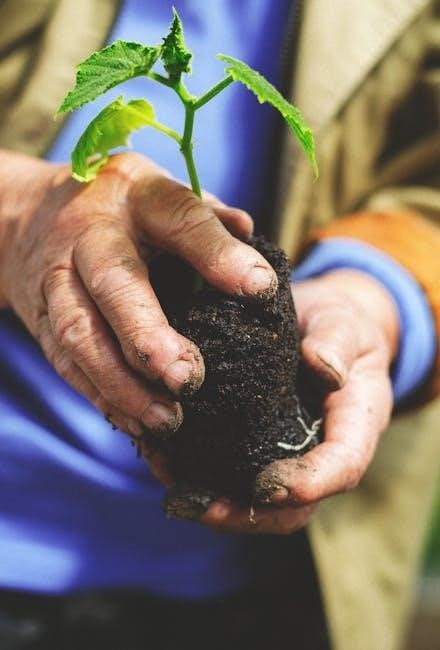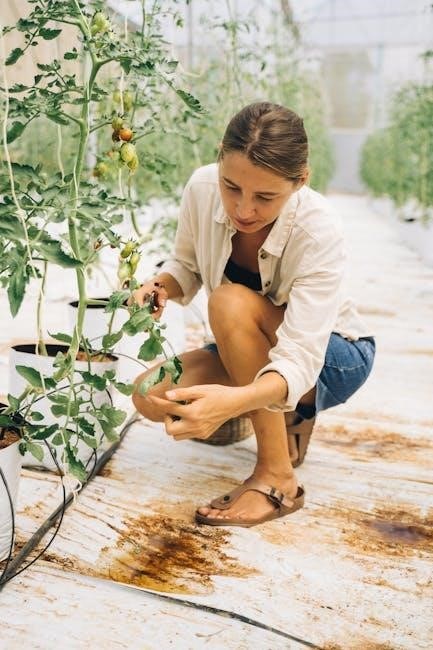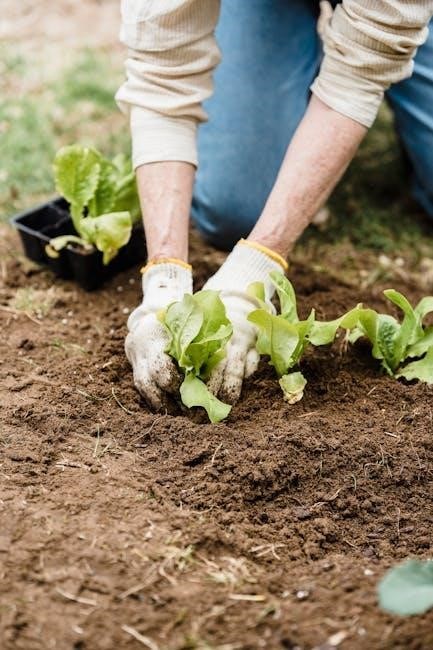Vegetable gardening in Perth is growing in popularity due to its Mediterranean climate‚ ideal for seasonal planting․ It offers fresh produce‚ environmental benefits‚ and cost savings‚ making it a rewarding hobby for many residents․
1․1 Benefits of Growing Your Own Vegetables
Growing your own vegetables in Perth offers numerous benefits‚ including access to fresh‚ nutrient-rich produce and significant cost savings․ It promotes a healthier lifestyle by encouraging consumption of seasonal‚ organic foods․ Gardening also fosters a sense of accomplishment and connection to nature․ Additionally‚ it reduces carbon footprints by eliminating transportation emissions associated with store-bought vegetables․ For families‚ it can be an educational activity‚ teaching children about sustainability and nutrition․ Moreover‚ homegrown vegetables often taste better‚ and you can control the use of pesticides and fertilizers․ This hobby also strengthens community ties through shared knowledge and resources‚ making it a rewarding endeavor for Perth residents․
1․2 Understanding Perth’s Mediterranean Climate
Perth’s Mediterranean climate is characterized by warm‚ dry summers and mild‚ wet winters‚ making it ideal for vegetable gardening․ The region’s long growing season allows for year-round cultivation‚ with distinct planting times for different vegetables․ Summer months bring high temperatures‚ requiring drought-tolerant varieties‚ while winter’s cooler conditions suit leafy greens and root vegetables․ Understanding this climate helps gardeners choose appropriate crops and manage water efficiently․ The predictable seasonal patterns enable gardeners to plan effectively‚ ensuring optimal growth and productivity․ This climate also supports a wide variety of vegetables‚ making Perth an excellent location for diverse and successful vegetable gardens․ Proper planning aligns with the climate’s advantages․

Best Vegetables to Grow in Perth
Growing a variety of vegetables in Perth is rewarding due to its climate․ Popular choices include tomatoes‚ leafy greens‚ carrots‚ zucchini‚ and herbs like basil‚ all thriving in the Mediterranean conditions․
2․1 Seasonal Vegetables for Spring
Spring in Perth is ideal for planting a variety of vegetables․ Tomatoes‚ cucumbers‚ and zucchini thrive in the warming temperatures‚ while leafy greens like spinach and kale continue to grow well․ Carrots‚ radishes‚ and beans also do exceptionally well during this season․ Herbs such as basil and mint flourish‚ adding fresh flavors to dishes․ The mild weather allows for successive sowings‚ ensuring a continuous harvest․ It’s also a great time to plant broccoli and cauliflower‚ which prefer cooler conditions before the summer heat sets in․ With proper planning‚ spring gardens in Perth can be bountiful and diverse․
2․2 Summer Vegetables Suitable for Perth
Summer in Perth is perfect for growing heat-tolerant vegetables․ Tomatoes‚ cucumbers‚ and zucchinis thrive in the warm weather‚ while eggplants and capsicums love the sunny conditions․ Leafy greens like spinach may bolt‚ so opt for heat-resistant varieties or switch to Asian greens․ Herbs such as basil and mint flourish‚ adding fresh flavors to summer dishes․ Corn and pumpkins also grow well‚ benefiting from Perth’s long summers․ Ensure adequate watering‚ as vegetables need consistent moisture to withstand the heat․ With proper care‚ your summer garden can yield a bountiful harvest of fresh‚ flavorful produce․
2․3 Autumn and Winter Vegetable Options
Autumn and winter in Perth offer ideal conditions for growing a variety of cool-season vegetables․ Broccoli‚ cauliflower‚ kale‚ and spinach thrive in the cooler months‚ while root vegetables like carrots‚ beets‚ and radishes also excel․ These crops tolerate Perth’s mild winters and can be harvested fresh for soups‚ stews‚ and salads․ Planting in early autumn ensures a head start‚ as the soil remains warm enough for germination․ Winter gardening in Perth is rewarding‚ with many vegetables continuing to grow steadily․ Proper planning and timing are key to maximizing yields during these seasons‚ making your garden productive year-round․

Soil Preparation and Fertilization
Soil preparation is vital for a thriving vegetable garden in Perth․ Start by testing your soil type to determine its structure and nutrient levels․ Adding compost or well-rotted manure enhances fertility and improves drainage․ Balancing pH levels ensures optimal plant growth․ Regular fertilization with organic matter like worm juice or mulch promotes healthy root development and robust yields․ Proper soil care lays the foundation for a productive and sustainable garden in Perth’s diverse soil conditions․
3․1 Understanding Soil Types in Perth
Perth’s soil types vary‚ ranging from sandy‚ clay‚ and loam‚ each with unique characteristics․ Sandy soils drain quickly but lack nutrient retention‚ while clay soils hold water and nutrients but can be heavy․ Loam‚ a balanced mix‚ is ideal for vegetable gardening․ Understanding your soil type helps tailor preparation and fertilization․ Perth’s Mediterranean climate also influences soil health‚ with hot summers potentially dehydrating the soil․ Testing your soil type is the first step to creating a thriving garden․ Adding organic matter like compost or manure can improve soil structure and fertility‚ ensuring optimal growing conditions for vegetables in Perth’s diverse soil landscape․
3․2 Tips for Improving Soil Structure
Improving soil structure in Perth involves addressing common issues like sandy or clay-dominated soils․ Adding organic matter such as compost‚ manure‚ or leaf mold enhances nutrient retention and drainage․ Mulching helps retain moisture and suppress weeds‚ while cover cropping replenishes soil health․ Minimal tillage prevents soil disruption‚ promoting beneficial microorganisms․ Avoiding over-tilling and excessive watering can prevent compaction and erosion․ Incorporating worm castings or green manure boosts fertility․ Balancing pH levels and integrating natural amendments ensures a thriving soil ecosystem for vegetable growth․ Regular testing and adjustments maintain optimal conditions‚ fostering a productive and sustainable garden in Perth’s challenging climate․
3․3 Organic Fertilizers for Vegetable Gardens

Organic fertilizers are essential for maintaining healthy soil and promoting robust vegetable growth in Perth gardens․ Composted manure and green waste enrich the soil with nutrients and improve its structure․ Worm castings‚ rich in micronutrients‚ are ideal for seedlings and mature plants․ Blood and bone meal provide slow-release nitrogen and phosphorus‚ while fish emulsion offers a quick nitrogen boost․ Mulching with straw or bark chips retains moisture and suppresses weeds․ Natural additives like kelp meal and alfalfa pellets add trace minerals‚ enhancing plant health․ Using these organic options ensures a chemical-free‚ sustainable approach to fertilizing‚ supporting biodiversity and long-term soil fertility in Perth’s vegetable gardens․

Garden Layout and Planning
Effective garden layout maximizes space and productivity‚ ensuring optimal sunlight and air circulation․ Plan beds according to vegetable size‚ using raised beds for better drainage and accessibility․
4․1 Choosing the Right Location for Your Garden
Selecting a suitable location is crucial for a thriving vegetable garden in Perth․ Ensure the area receives at least six hours of sunlight daily‚ as most vegetables require ample light to grow․ Avoid low-lying spots where water may collect‚ as this can lead to root rot and other issues․ Ideally‚ the garden should be on a gentle slope to allow good drainage․ Additionally‚ proximity to a water source is essential for efficient irrigation․ Consider the direction of prevailing winds and use natural or artificial barriers to protect plants from harsh conditions․ Proper placement ensures healthy growth and productivity․
4․2 Companion Planting Strategies
Companion planting enhances growth and reduces pests in your Perth garden․ Pairing vegetables with herbs and flowers can deter unwanted insects and improve soil health․ For example‚ basil repels aphids‚ while marigolds discourage nematodes․ Planting taller crops like sunflowers or corn on the north side prevents shade on smaller plants․ Intercropping vegetables like tomatoes with spinach or carrots with radishes maximizes space and promotes diversity․ Avoid placing members of the Brassica family near strawberries‚ as they can hinder growth․ This strategic approach fosters a balanced ecosystem‚ boosting productivity and reducing the need for pesticides․ Plan carefully to reap the benefits of harmonious plant combinations․
4․3 Space-Saving Gardening Techniques
Optimizing space is key for successful vegetable gardening in Perth‚ especially in smaller areas․ Use vertical gardening with trellises or wall-mounted planters for vining plants like tomatoes or cucumbers․ Implement square foot gardening to maximize bed space by planting closely spaced crops․ Consider container gardening‚ where vegetables like herbs‚ leafy greens‚ and strawberries thrive in pots․ Intercropping allows growing multiple plants together‚ such as carrots with radishes or lettuce with peas․ Utilize raised beds with efficient layouts to minimize pathways and grow more produce․ These techniques ensure productive gardening even in limited spaces‚ making it accessible for urban and suburban growers in Perth․

Planting Times and Schedules
Understanding seasonal planting times is crucial for a thriving vegetable garden in Perth․ A monthly planting calendar helps growers schedule seeds and seedlings effectively‚ ensuring optimal yields․
5․1 Monthly Planting Calendar for Perth
A monthly planting calendar is essential for Perth gardeners‚ ensuring vegetables thrive in the Mediterranean climate․ Spring (Sept-Nov) is ideal for tomatoes‚ peppers‚ and zucchini‚ while summer (Dec-Feb) suits eggplants and okra․ Autumn (Mar-May) is perfect for broccoli‚ spinach‚ and carrots‚ and winter (June-Aug) favors Brussels sprouts and kale․ Understanding these seasonal rotations maximizes yields and prevents pests․ Soil preparation and weather patterns‚ like cold snaps in winter‚ should guide planting decisions․ Using seedlings for warm-weather crops and direct sowing for cool-season varieties optimizes success․ Staying attuned to Perth’s climate ensures a bountiful harvest year-round‚ making gardening both productive and enjoyable․
5․2 When to Sow Seeds vs․ Seedlings
In Perth’s climate‚ deciding between sowing seeds or planting seedlings depends on the vegetable type and season․ Seeds for hardy plants like tomatoes and zucchini thrive when sown directly in spring and summer․ Seedlings‚ however‚ are better for sensitive varieties such as eggplants and capsicums‚ as they establish faster․ For cool-season crops like broccoli and spinach‚ direct sowing in autumn and winter is preferred․ Seedlings offer a head start in warmer months‚ reducing vulnerability to pests․ Timing is crucial‚ with seeds typically sown 1-2 months before the last frost for winter crops․ Balancing these methods ensures optimal growth and adapts to Perth’s seasonal variations‚ maximizing garden productivity and success year-round․

Water Management and Conservation

Efficient water use is vital in Perth’s dry climate․ Use drip irrigation‚ mulch‚ and water deeply but infrequently to encourage root growth․ Harvest rainwater for sustainability and reduce waste by monitoring soil moisture levels regularly․ Avoid overhead watering to minimize evaporation and fungal diseases‚ ensuring every drop counts for healthy vegetable growth․
6․1 Efficient Irrigation Methods
Drip irrigation stands out as a highly efficient method for vegetable gardens in Perth․ By delivering water directly to plant roots‚ it minimizes evaporation and runoff‚ conserving up to 50% more water compared to traditional sprinkler systems․ Soaker hoses are another effective option‚ releasing water slowly into the soil․ Additionally‚ using timers and moisture sensors ensures plants receive the right amount of water without overwatering․ Mulching around plants also retains soil moisture‚ reducing the need for frequent irrigation․ These methods not only save water but also promote healthy plant growth by maintaining consistent soil hydration levels throughout the growing season․
6․2 Watering Tips for Different Vegetables
Watering requirements vary among vegetables‚ so understanding their needs is crucial․ Tomatoes and peppers thrive with deep‚ regular watering but avoid getting water on leaves to prevent disease․ Leafy greens like spinach and kale prefer consistent moisture but require less water overall․ Root vegetables‚ such as carrots and beets‚ benefit from deep‚ infrequent watering to encourage taproot growth․ Overwatering can lead to rot and poor flavor․ Herbs like basil and mint are water-loving but prone to root rot if soil stays too moist․ Monitor soil moisture and adjust watering schedules based on weather conditions to ensure optimal growth and flavor for your vegetables․

Pest and Disease Management
Effective pest and disease management is crucial for a thriving vegetable garden in Perth․ Regular monitoring‚ organic solutions‚ and preventive measures help protect plants from common threats․
7․1 Common Pests in Perth Gardens
Perth gardens face various pests that can damage vegetable crops․ Aphids‚ whiteflies‚ and caterpillars are common‚ feeding on leaves and flowers․ Snails and slugs thrive in moist conditions‚ targeting seedlings․ Spider mites are another issue‚ especially in dry weather‚ causing yellowing leaves․ These pests can spread diseases and reduce yields‚ making early detection and control essential for maintaining healthy plants․ Regular inspection and organic pest control methods are recommended to mitigate their impact and protect your garden’s productivity throughout the growing season․ Proper management ensures a balanced ecosystem and a successful harvest․
Organic pest control is a sustainable way to manage common garden pests in Perth․ Natural predators like ladybugs and lacewings can be introduced to prey on aphids and other insects․ Neem oil and garlic sprays are effective against pests‚ while diatomaceous earth dehydrates insects like slugs and snails․ Companion planting‚ such as marigolds and basil‚ repels pests naturally․ Physical barriers and traps also help control infestations without harmful chemicals․ Regularly inspecting plants and maintaining healthy soil promotes resilience‚ reducing the need for pesticides․ These methods ensure a safe and eco-friendly approach to protecting your vegetable garden‚ preserving biodiversity and soil health․ Early intervention is key to preventing pest outbreaks․ Preventing and managing diseases in your Perth vegetable garden is crucial for a healthy harvest․ Regularly inspect plants for signs of disease‚ such as yellowing leaves or black spots․ Ensure good air circulation by spacing plants appropriately and pruning as needed․ Water plants at the base to avoid moisture on leaves‚ which can encourage fungal growth․ Use organic fungicides like copper-based products or bicarbonate solutions for treatment․ Rotate crops annually to break disease cycles and maintain soil health․ Sanitize tools and remove infected plants promptly to prevent the spread of disease․ Healthy soil and balanced nutrition also enhance plant resilience against pathogens․ Early detection is key to effective management․ Gloves‚ trowels‚ and watering cans are essential tools․ Compost‚ mulch‚ and irrigation systems support plant growth․ Quality seeds and fertilizers ensure healthy and productive vegetable gardens in Perth․ For a successful vegetable garden in Perth‚ essential tools include gloves‚ trowels‚ rakes‚ shovels‚ watering cans‚ and pruning shears․ A measuring tape and garden fork are also handy․ Use a wheelbarrow for transporting materials and labels for plant identification․ These tools ensure efficiency in planting‚ maintaining‚ and harvesting your vegetables․ Proper equipment helps protect your hands and makes tasks easier․ Investing in durable‚ high-quality tools will support your gardening journey and contribute to a thriving vegetable garden in Perth’s unique climate․ Key materials for a thriving vegetable garden in Perth include high-quality potting soil‚ compost‚ and mulch to retain moisture and suppress weeds․ Irrigation systems‚ such as drip irrigation‚ are ideal for water efficiency․ Raised garden beds or containers with good drainage are recommended‚ especially for Perth’s sandy soils․ Supports like trellises or stakes are essential for climbing plants like tomatoes and peas․ Organic fertilizers‚ like manure or worm castings‚ enhance soil fertility․ Additionally‚ gardening gloves and knee pads provide comfort while working․ These materials ensure optimal growing conditions and productivity in your vegetable garden‚ tailored to Perth’s Mediterranean climate․ Vegetable gardening in Perth is rewarding with the right guidance․ For further support‚ explore local gardening communities‚ workshops‚ and online resources like planting calendars and troubleshooting guides․ Common issues in Perth vegetable gardens include pests‚ diseases‚ and soil problems․ Aphids and whiteflies can be managed with neem oil or natural predators․ Powdery mildew and root rot often result from overwatering or poor air circulation․ Regularly inspect plants‚ ensure proper drainage‚ and treat issues early․ Overwatering can also lead to nutrient deficiencies‚ so monitor soil moisture and adjust irrigation schedules․ For persistent problems‚ consult local gardening experts or resources like the Perth Horticultural Society․ A comprehensive gardening guide can also provide detailed solutions for specific challenges‚ helping you maintain a healthy and productive garden throughout the year․ Perth offers a wealth of resources and communities to support vegetable gardeners․ The Perth Horticultural Society provides workshops‚ while Men of the Trees offers native plant advice․ Local nurseries like Green thumbs Nursery in Roleystone and The Green Shed in Subiaco supply quality seeds and seedlings․ Community gardens‚ such as Perth City Farm and Cottesloe Community Garden‚ offer shared spaces and knowledge exchange․ Online forums like the Perth Gardening Facebook group connect enthusiasts for advice and support․ Engage with these local networks to enhance your gardening journey and gain expert tips tailored to Perth’s unique climate․ 7․2 Organic Pest Control Solutions
7․4 Preventing and Managing Diseases

Tools and Materials Needed
8․1 Essential Gardening Tools
8․2 Recommended Gardening Materials
9․1 Troubleshooting Common Issues
Perth Gardening Guide9․2 Local Resources and Gardening Communities
Perth Horticultural Society